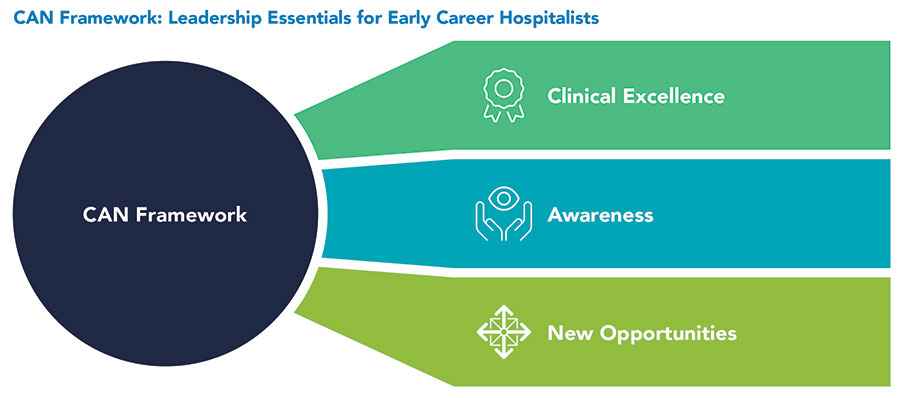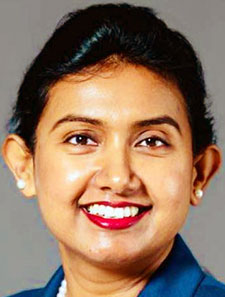Hospital medicine leaders drive change, inspire teams, and shape the future of medicine. Early career hospitalists—those out of residency for five years or less—often face unique challenges in being chosen for leadership opportunities in both academia and community settings. A study highlighted that early career hospitalists expressed the importance of “being respected and recognized,” and “dissemination of work,” both of which are associated with career satisfaction.¹
 Leadership opportunities amplify positive, meaningful impact on a larger number of patients, learners, and the systems in which hospitalists practice. However, there is no roadmap to help early-career hospitalists learn how to advance toward leadership opportunities.
Leadership opportunities amplify positive, meaningful impact on a larger number of patients, learners, and the systems in which hospitalists practice. However, there is no roadmap to help early-career hospitalists learn how to advance toward leadership opportunities.
The pathway to leadership may seem daunting, but a structured approach can pave the way. The proposed CAN framework—a three-part approach—empowers early-career hospitalists to navigate the rewarding leadership journey. CAN stands for clinical excellence, awareness, and new opportunities. The benefits of this framework are threefold:
Building credibility and trust through clinical excellence, positioning early-career hospitalists as respected leaders
Fostering collaboration and accelerating team development by enhancing self and social awareness
Embracing innovative projects, enabling hospitalists to expand their influence and drive impactful innovation
Clinical Excellence
Particularly after joining a new organization, the clinical excellence of an early-career hospitalist is a cornerstone of reputation and leadership potential. Clinical care is a key source of career fulfillment for early-career hospitalists.¹ A strong clinical background enables leaders to make informed decisions, understand the complexities of patient care, and gain credibility with peers and teams. During clinical service, physicians directly observe the impact of established hospital policies and can identify care gaps—critical insights for implementing effective changes.
To build and maintain clinical excellence, hospitalists should regularly update their knowledge through continuing medical education, medical journals, conferences, and discussions with consultant teams to understand their clinical decision-making processes, rather than simply following recommendations. Furthermore, involving advanced practice practitioners, residents, and medical students during clinical decision making sharpens clinical knowledge and team-building skills. Leadership is not a destination but a continuous journey of learning and growth.
Awareness
Technical skills and individual talent alone are not sufficient for excelling in leadership positions. In today’s dynamic healthcare environment, leaders need both self-awareness and social awareness to navigate complex hospital teams and systems effectively.
Self-awareness involves understanding and accepting yourself, including your emotional triggers, biases, and strengths.2,3 Self-aware individuals tend to be more fulfilled, confident, and likely to advance in their careers. Pausing briefly during emotionally charged moments—a practice common among successful leaders—can lead to more effective decision making.4
Social awareness is the ability to understand others’ motives, non-verbal cues, tone, and body language. Without social intelligence, leaders risk miscommunication and unnecessary conflict.2,3 While pursuing new leadership opportunities, it’s important to be aware that not having all the answers is okay and mistakes are an inevitable part of growth. Together, self-awareness and social awareness complement technical expertise, accelerating both personal and professional development.2,3 Seeking feedback and reflection exercises can further refine these skills, positioning hospitalists for leadership success.
New Opportunities
A willingness to embrace new opportunities often lays the foundation for leadership growth, enabling early-career hospitalists to discover new career paths. Senior leadership teams seek individuals they trust to get the job done, who demonstrate a proactive, solutions-oriented mindset. Saying “yes” to new opportunities can serve as a stepping stone for learning and networking, demonstrating a commitment to innovation. However, not all opportunities are equally beneficial—selecting the right ones requires a realistic evaluation of current commitments, personal goals, and professional priorities.5
Declining an opportunity does not reflect a lack of ambition but rather a strategic approach to career advancement. Hospitalists should align their choices with their long-term aspirations, leveraging mentorship and peer support to make informed decisions. As our career goals and aspirations evolve, the opportunities we pursue may also change. Being intentional about career choices, remaining adaptable, and maintaining a continuous learning mindset will ensure long-term professional growth.
Transitioning into leadership requires a dynamic skill set and a strategic approach to professional development. The CAN framework provides early-career hospitalists with a practical, actionable pathway to rise above challenges, seize opportunities, and inspire others to follow their lead. By focusing on clinical excellence, awareness, and new opportunities, hospitalists can forge a meaningful leadership journey—one that fosters innovation, elevates patient care, and shapes the future of hospital medicine.
 Dr. Hoque, associate professor of medicine and physician lead of patient experience at Saint Louis University and the inaugural medical director of Bordley Tower at SSM Health Saint Louis University Hospital, both in St. Louis, oversees four inpatient units. She is also the medical director of patient experience for the SSM Health region, driving initiatives across seven hospitals. X @Farzana_HoqueMD
Dr. Hoque, associate professor of medicine and physician lead of patient experience at Saint Louis University and the inaugural medical director of Bordley Tower at SSM Health Saint Louis University Hospital, both in St. Louis, oversees four inpatient units. She is also the medical director of patient experience for the SSM Health region, driving initiatives across seven hospitals. X @Farzana_HoqueMD
References
- Cumbler E, et al. Keys to career success: resources and barriers identified by early career academic hospitalists. J Gen Intern Med. 2018;33(5):588-589. doi:10.1007/s11606-018-4336-7.
- Hoque F. Leadership & professional development: emotional intelligence strengthens leadership presence. J Hosp Med. 2023;18: 918-919. doi:10.1002/jhm.13158.
- Hoque F. Emotional intelligence: three pivotal points for effective physician leadership. Physician Leadership Journal. (2024);11(2)32/35. doi:10.55834/plj.7357727642
- Hoque F. Leadership & professional development: The power of pause. J Hosp Med. 2024;19:204-205. doi:10.1002/jhm.13284.
- Shah SS. A more opportune moment. J Hosp Med. 2024;1-2. doi:10.1002/jhm.13448.